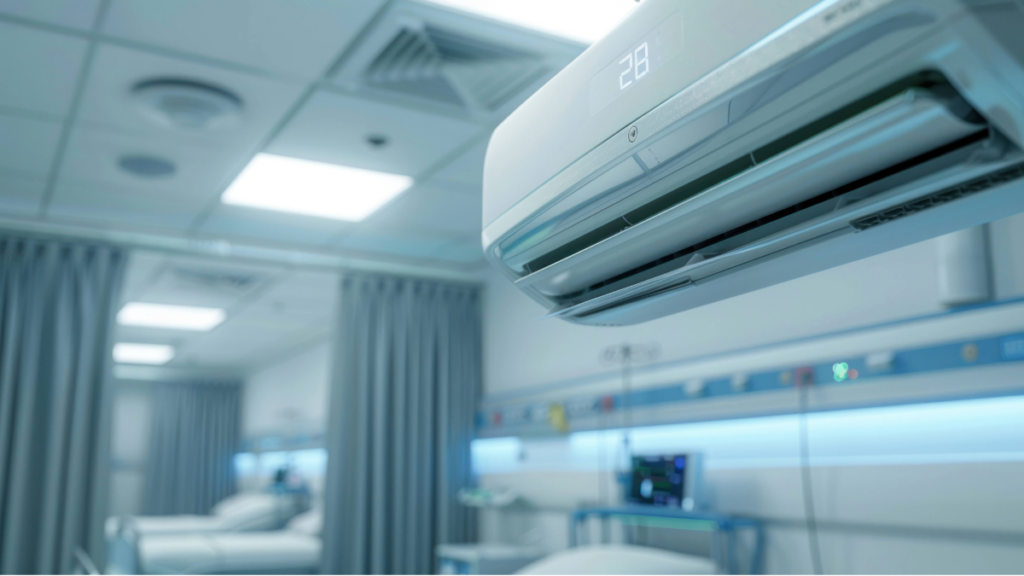HVAC systems in hospitals and medical facilities are essential for infection control, air quality, and patient comfort. Proper ventilation reduces airborne pathogens, while HEPA filters and UV purification help maintain a safe, sterile environment. Zoned airflow control, such as negative pressure in isolation rooms and positive pressure in surgical suites, prevents contamination.
With advanced HVAC technology, hospitals now use automated climate control and IoT-enabled monitoring to improve efficiency and reduce costs.
At Custom Air Conditioning & Air Quality, we specialize in HVAC solutions that enhance safety, comfort, and energy efficiency for healthcare facilities. Investing in high-quality HVAC systems and proactive maintenance ensures clean, controlled air for patients and staff.
Table of Contents

The Role of HVAC Systems in Hospitals and Clinics: Ensuring Clean and Efficient Airflow
HVAC systems in healthcare facilities do far more than regulate temperature, they are critical for infection control, patient comfort, and operational efficiency.
How HVAC Systems Improve Healthcare Environments
- Infection Prevention
- Proper ventilation and HEPA filtration remove airborne contaminants, reducing the spread of bacteria, viruses, and allergens.
- Effective airflow management helps prevent hospital-acquired infections (HAIs) by controlling airborne pathogens such as COVID-19, tuberculosis, and MRSA.
- Temperature Control
- Precise climate regulation ensures a comfortable and stable environment for patients, staff, and temperature-sensitive medical equipment.
- Maintaining proper temperatures in operating rooms, neonatal units, and laboratories is essential for patient care and safety.
- Humidity Management
- Prevents mold growth and maintains ideal moisture levels in sterile environments and medical storage areas.
- Balanced humidity levels help protect patient respiratory health, reducing irritation and infection risks.
- Air Pressure & Zoned Airflow Control
- Negative pressure rooms isolate infectious patients and prevent contamination from spreading throughout the facility.
- Positive pressure rooms (e.g., surgical suites) ensure sterile environments by keeping outside contaminants from entering.
- Advanced Filtration & UV Purification
- HEPA filters capture 99.97% of airborne particulates, including bacteria and viruses.
- UV light systems add another layer of protection by eliminating harmful microbes before they circulate in the air.
- Energy Efficiency & Cost Savings
- Smart HVAC systems use automated climate control and occupancy sensors to adjust airflow based on room usage.
- This helps hospitals reduce wasted energy, lower utility costs, and improve sustainability while maintaining strict air quality standards.

Key Challenges in Healthcare HVAC and How to Overcome Them
Hospitals and medical facilities face unique HVAC challenges that directly impact infection control, patient care, and operational efficiency.
These systems must run continuously, comply with strict health regulations, and maintain air quality in high-risk areas, all while balancing energy efficiency and cost management. Addressing these challenges requires proactive maintenance, smart technology, and advanced air quality solutions.
Ensuring Air Quality in High-Traffic and Critical Care Areas
High-occupancy areas like emergency departments, waiting rooms, and patient wards create a significant risk for airborne contamination and hospital-acquired infections (HAIs).
Proper ventilation and filtration are essential to minimize the spread of bacteria, viruses, and allergens. In addition, operating rooms, ICUs, and sterile storage areas require highly controlled air circulation to maintain sterility and prevent cross-contamination.
Implementing HEPA filtration, UV air purification, and increased air exchange rates ensures a cleaner, safer environment for both patients and staff.
Managing Temperature and Humidity for Patient Comfort and Safety
Precise temperature and humidity control is critical for operating rooms, neonatal units, and pharmaceutical storage. Fluctuations in climate conditions can compromise patient safety, affect medical equipment performance, and promote mold growth.
Unregulated humidity can also create respiratory health risks for vulnerable patients. By using automated climate control systems with IoT-enabled sensors, hospitals can continuously monitor and adjust environmental conditions to maintain stability and sterility in critical areas.
Balancing Energy Efficiency with 24/7 Operation
Hospitals operate around the clock, making HVAC one of the largest energy-consuming systems in a medical facility. Without smart energy management, HVAC systems often overcool or overheat empty spaces, leading to unnecessary energy waste and high utility costs.
Modern smart HVAC technology integrates occupancy-based controls, automated scheduling, and real-time monitoring to ensure energy-efficient operation without compromising patient comfort or air quality.
Meeting Healthcare Regulatory Standards and Compliance
Strict regulations from ASHRAE, CDC, and the Joint Commission dictate air filtration, ventilation rates, and pressure differentials to maintain infection control and patient safety.
Non-compliance can result in violations, increased infection risks, and even facility shutdowns. Regular inspections, proactive maintenance, and timely system upgrades ensure that hospitals meet stringent ventilation, filtration, and air exchange requirements, keeping operations safe and compliant.
Preventing HVAC System Failures and Emergency Downtime
HVAC system failures in ICUs, surgical suites, and isolation rooms can disrupt patient care and compromise air quality, posing serious health risks.
Many healthcare facilities lack backup power and emergency response plans, making them vulnerable to HVAC breakdowns during power outages or mechanical failures. Investing in preventive maintenance plans, backup power solutions, and emergency HVAC response protocols ensures continuous climate control, even in critical care areas.

Custom HVAC Solutions for Healthcare Facilities
We understand that hospitals, clinics, and medical facilities require specialized HVAC systems to maintain infection control, patient comfort, and regulatory compliance. Our customized HVAC solutions ensure clean air circulation, precise climate control, and energy efficiency to meet the unique demands of healthcare environments.
Our Healthcare HVAC Services
- HVAC Installation & Upgrades – We install state-of-the-art, energy-efficient HVAC systems designed for temperature-sensitive medical environments.
- Preventative Maintenance & Inspections – Regular filter changes, coil cleaning, and system tune-ups to prevent failures and ensure consistent airflow.
- Air Quality Improvements – HEPA filtration, UV purification, and humidity control to eliminate airborne contaminants and prevent hospital-acquired infections (HAIs).
- Smart HVAC Technology – IoT-enabled sensors, automated climate control, and occupancy-based adjustments to optimize energy use and improve system efficiency.
- Zoned Airflow Control – Negative pressure rooms for isolation and positive pressure surgical suites, ensuring infection containment and air purity.
- Regulatory Compliance – We adhere to ASHRAE, CDC, and Joint Commission standards, ensuring proper ventilation, filtration, and air exchange rates.
Our goal is to help healthcare providers enhance infection control, improve patient well-being, and reduce operational costs through efficient and reliable HVAC solutions.
Whether your facility needs routine maintenance, system upgrades, or a new HVAC installation, Custom Air Conditioning & Air Quality is committed to providing expert service and industry-leading solutions for a safer, healthier environment.

Prioritizing Clean and Efficient Airflow in Healthcare
Maintaining clean, efficient, and well-regulated airflow in healthcare facilities is essential for patient health, infection control, and staff comfort. A properly designed and maintained HVAC system ensures that hospitals and clinics meet strict air quality standards, reducing the spread of airborne diseases and creating a safer environment for everyone.
By adopting smart HVAC technology, advanced filtration, and proactive maintenance, healthcare facilities can significantly improve patient safety, operational efficiency, and energy savings. Implementing automated climate control, real-time monitoring, and regular inspections helps prevent system failures, optimize air circulation, and comply with industry regulations.
At Custom Air Conditioning & Air Quality, we specialize in tailored HVAC solutions for medical facilities, ensuring consistent air quality, reliable performance, and cost-effective energy management.
Now more than ever, hospitals must prioritize HVAC upgrades and proactive maintenance to safeguard patient well-being, staff productivity, and long-term facility sustainability. Investing in modern, well-maintained HVAC systems is an investment in health, safety, and efficiency.




